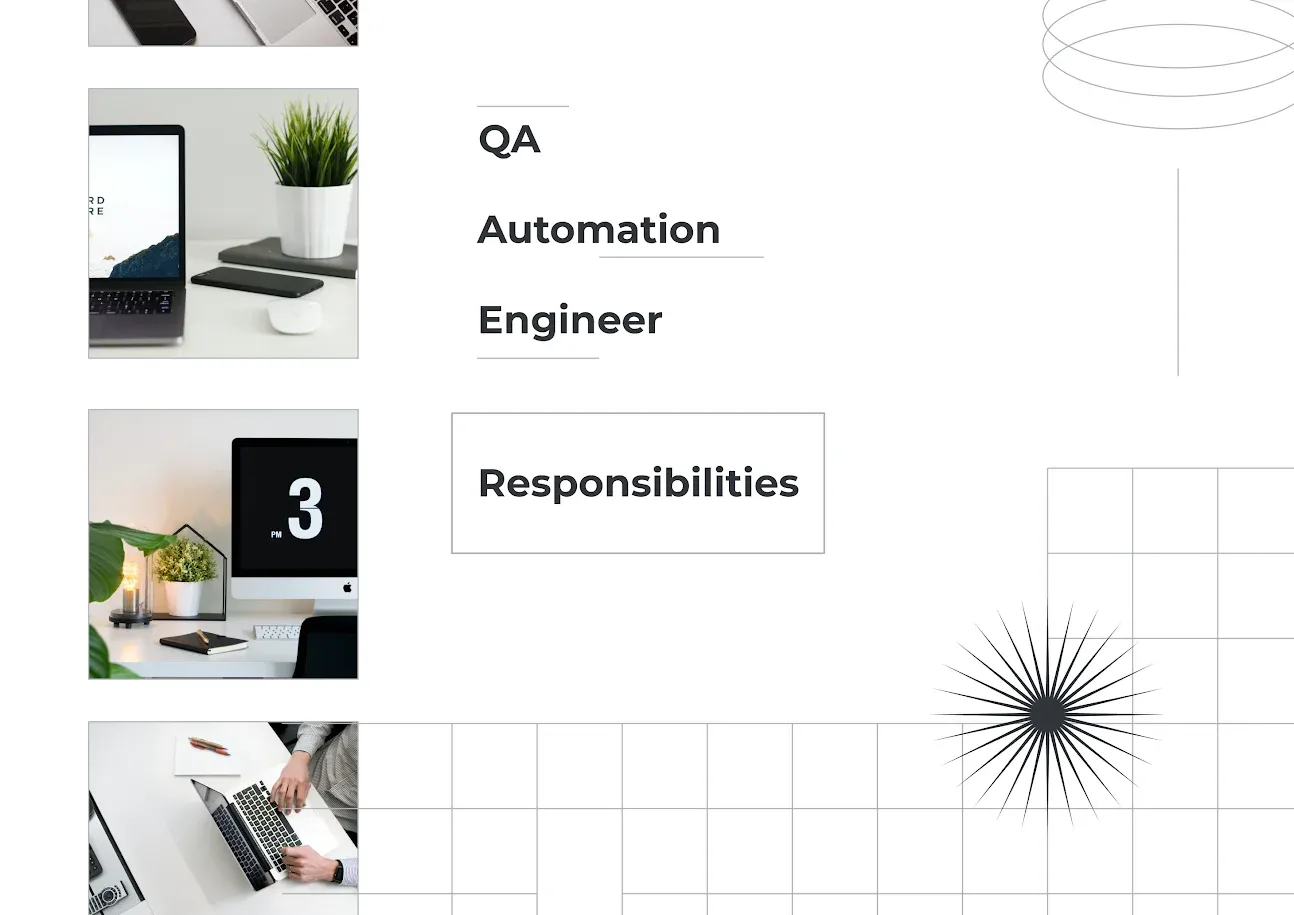QA Automation Engineer: Skills and Responsibilities

As statistics show, 31% of businesses have fully automated at least one function. In the future, this figure will grow as more and more businesses hire QA (Quality Assurance) automation engineers to develop, test, and implement different automation technologies to help organizations with different scalability streamline their business, development, or various service processes. Automated testing saves time and money because it eliminates the need to hire manual software testers and write extensive test scripts. Automated tests can be run on multiple devices or the entire network without a break. At Yojji, we have a full-stack team with QA automation engineers being one of the valuable resources. Our specialists perform a variety of tasks that help businesses across various industries stay on track.
In this article, we will focus on the main roles a QA automation engineer performs, the necessary scope of knowledge and skills a professional engineer needs, core responsibilities, and the most useful tools.
What is QA automation?
QA automation is an integral component of modern software development, streamlining the testing process through advanced tools. This method not only identifies glitches but also customizes tests for each project from the outset, significantly reducing the manual efforts previously required by QA professionals.
This automation revolutionizes how software is tested, allowing for more frequent and efficient testing. This rapid testing cycle accelerates product releases, updates existing software swiftly, and aligns with consumer demands. Key benefits of QA automation include its precision, speed, and the reusability of test scripts. Moreover, tests can be run continuously, around the clock.
As a QA automation tester, your role involves designing the framework that underpins these automated tests.
Different Types of QA Automation Testing:
Graphical User Interface (GUI) Testing: Here, the focus is on user interactions like keystrokes and mouse clicks to ensure a smooth and consistent user experience.
Application Programming Interface (API) Testing: This involves using tools to evaluate the software's message layer, testing individual components and overall performance, including response times and security.
Some prevalent QA automation tests include:
Functional Testing: Verifies if the software executes its intended functions correctly and produces the expected outcomes based on given inputs.
Performance Testing: A nonfunctional test that stresses the software under specific conditions to identify potential performance issues and ensure reliability.
Unit Testing: Focuses on individual functions or components, assessing aspects like user interface and overall application behavior.
Smoke Tests: Also known as "build verification testing", these evaluate the stability of the software's architecture and confirm that all primary functions are operational.

The QA Automation Engineer Role
IT automation has become a cornerstone of many industries because it streamlines customer service processes, eliminates any errors or defects a product may have. Therefore, high-quality products contain fewer errors and are delivered faster. A QA automation engineer designs automated tests to check the functionality of web and mobile applications, writes scripts, installs testing protocols, and provides effective test automation solutions.
Depending on the team size, its structure, clients’ needs, and objectives set, a QA automation engineer may have different roles. Below we will highlight the main ones.
Test automation engineer
A test automation engineer should have solid coding skills for designing and implementing various automated solutions. He checks if the software meets architectural requirements, develops and automates tests for software validation, ensures the high quality of the system, interacts with firmware developers and validation engineers.
QA team lead
A QA lead develops the necessary procedures and processes, maintains documentation, guides QA teams, coordinates development teams, and manages testing schedules.
Performance test engineer
Great software performance increases user loyalty, promotes high conversions, and continuous transactions. The role of a QA automation engineer is to advise on efficient performance testing strategies throughout the full software development cycle, implement the test framework, elaborate test plans based on the business needs and customer requirements, check the work of junior and mid-level specialists.
Automation Engineer Responsibilities

An automation engineer should have great soft skills and technical skills because he should interact closely with other teams and implement certain processes for business or service automation.
A quality assurance automation engineer is expected to perform the following duties:
-
Write clean, high-quality scripts that test product functionality automatically.
-
Conduct various tests for systems, networks, applications, databases, software.
-
Log and document errors in the tracking system.
-
Identify specific cases that should be automated and discuss them with manual QA engineers.
-
Develop the best automation solutions based on the clients’ requirements.
-
Participate in AQA plannings to define the sprint scope.
-
Collaborate with cross-functional teams (developers, product marketing managers) to find ways on how automation can improve the workflow.
-
Take part in brainstorms to come up with new ideas and designs that improve existing features.
-
Cooperate with a development team to formulate the tasks and explain post-release user feedback.
QA Automation Engineer Skills

A QA automation specialist should have a grasp of networks, hardware, web and desktop operating systems, obtain experience with robotics, analytics, AI. However, good technical skills are not always key when choosing a candidate for the position of an engineer, since a person can have all the answers, but won’t be able to get along with other team members and adapt to new processes. Thus, an ability to lead cross-departmental efforts, communicate with people with different technical backgrounds and experience levels is a must for a QA engineer. However, this list is not exhaustive, and below we will cover the basic technical and soft skills.
Technical skills:
- Great coding skills (Java, Python, SQL);
- Solid skills in framework design;
- Knowledge of fundamentals of QA methodology. A QA automation engineer should be well versed in manual and automated testing;
- Understanding HTML, CSS;
- Using patterns Page Object, Factory in automation;
- Experience in CI and CD;
- Proficient in using various tools, such as Maven, Selenoid, JUnit.
Soft skills:
Persistence
This quality allows the specialist to get to the root of the problem and develop flawless tests.
An ability to communicate and collaborate
A true professional always checks his ego at the door and understands that a successful picture is made of the expertise of all team members, including developers, product managers, executives. Besides, an engineer should be able to logically express his thoughts and convey his point of view to other team members.
End-user empathy
A QA automation engineer should step into the shoes of the end-user to understand how the product is expected to perform.
Flexibility
The introduction of new requirements, the adjustment of deadlines, the extension or reduction of a team are common changes in a project. A true professional should be able to adapt to the new environment to become a strong player.
Eagerness to learn
Professionals must continually expand their skills as organizations require QA automation engineers who are experts at what they know but also keep up with the latest trends and constantly evolve. If you want to stay at the top of the game, constant learning is key.
Knowledge of development methodologies
An experienced QA engineer should be familiar with Scrum, Agile development methodologies and be able to work within a specific system.
Required Experience
Many companies want to recruit an experienced and competent specialist so as not to waste time on additional training and explaining the basics.
Overall, companies are looking for a candidate with at least 3 years of experience in performing automated tests and utilizing various tools. Here is an example of what kind of experience a candidate should have.
- At least 5 years of experience in the field of automation testing of software products and web/mobile applications using the structured testing methodology.
- At least 3 years of experience with automated testing tools.
- Intermediate level in using specific programming languages (Java, Python, PHP).
- Deep knowledge of CSS, HTML, XML.
- Great communication skills: an ability to find a common language with all team members.
- Analytical, problem-solving, and decision-making skills, the ability to see the root of the problem and come up with efficient, creative, and cost-effective solutions.
Automation Tools
High-rated automation software is a must for a QA automation engineer because it facilitates the integration of QA processes, helps solve certain automation problems, and optimizes the testing process.
Here are the most effective and sought-after automation tools an accomplished QA automation engineer uses in his work.
- Automation testing tools (Selenium, Ranorex).
- Ready-made automation frameworks (Serenity BDD, Cypress).
- Various mobile automation testing tools.
- API testing tools (jMeter, REST Assured).
- Continuous integration tools (Teamcity, Bamboo, Jenkins).
Bottom Line
Taking into account all the above, a QA automation engineer is a valuable player in your team as he ensures the top-notch quality of the final product. At Yojji, we have accomplished QA automation engineers who can use their knowledge and expertise to drive your business to success.
Looking to hire developers?



